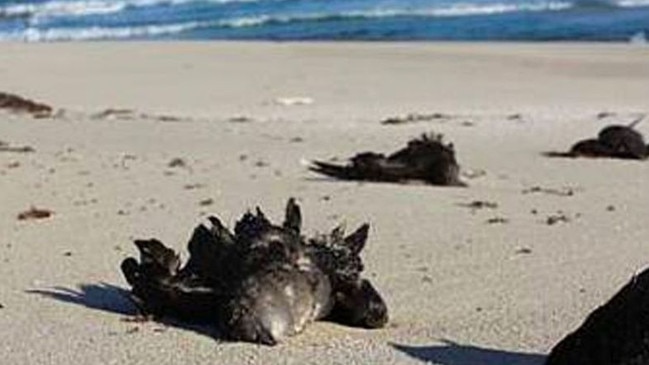Mass mutton bird deaths on NSW beaches prompts concern
Tens of thousands of mutton birds have washed up on NSW beaches in recent days, further concerning experts following a collapse in numbers.

Tens of thousands of mutton birds have washed up on NSW beaches in recent days, further concerning experts following a collapse in numbers reaching their breeding grounds this year.
The Weekend Australian revealed population levels at the birds’ breeding grounds in southern Australia were at only 30 per cent to 40 per cent of normal levels for this time of year.
Further baffling experts, the normally punctual species, also known as short-tailed shearwaters, were running weeks late in their annual migration from Japan, Siberia and Alaska.
Reports on Wednesday of mass mortalities on NSW beaches in recent days suggests the migration is even more delayed than first thought, further threatening the breeding season.
“By now they would normally be south of Tasmania, feeding close to the Antarctic convergence, but if they are being found on beaches in NSW that suggests there are still birds arriving from the northern hemisphere,” said Eric Woehler, convener of BirdLife Tasmania.
“It’s another piece of the jigsaw in … the anomaly this year.”
Dr Woehler warned that those birds arriving late to breeding grounds — coastal areas and small islands in southern Australia, especially islands in Bass Strait — may not have the strength or time to breed this year.
The birds’ abundance and longevity means the population should recover from any one disastrous year, but there is concern a trend may be developing following a similar crash in numbers in 2014.
BirdLife Australia spokesman Sean Dooley told The Australian he had confirmed the mass deaths, known as wrecks, had occurred in recent days, across a wide stretch of the NSW coastline, following earlier reports in October.
“I can definitely confirm that we are getting first-hand accounts of shearwaters washing up on beaches all around Sydney, as far south as the Illawarra and as far north as Port Macquarie, this week,” Mr Dooley said.
“The fact that it’s happening now suggests strongly to me that they have more than likely just arrived, or they have arrived and been unable to find food once they’re here.”
The birds do not feed during migration, which experts believe may have been delayed because of an unusual warm water mass in the North Pacific Ocean, known as “the blob”. This warm water forces the birds’ main prey — krill — to descend deeper to find cooler water; too deep for the diving shearwaters.
This theory is supported by mass wrecks observed earlier on Alaskan beaches. The NSW mass wrecks suggest the birds may not have been as well fed as usual before starting migration.
Egg surveys in late November and early December will determine the scale of the losses, which may force cancellation of the Aboriginal harvest of chicks in April.




To join the conversation, please log in. Don't have an account? Register
Join the conversation, you are commenting as Logout